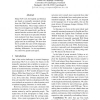Free Online Productivity Tools
i2Speak
i2Symbol
i2OCR
iTex2Img
iWeb2Print
iWeb2Shot
i2Type
iPdf2Split
iPdf2Merge
i2Bopomofo
i2Arabic
i2Style
i2Image
i2PDF
iLatex2Rtf
Sci2ools
ACL
2015
2015
Tagging Performance Correlates with Author Age
Many NLP tools for English and German are based on manually annotated articles from the Wall Street Journal and Frankfurter Rundschau. The average readers of these two newspapers are middle-aged (55 and 47 years old, respectively), and the annotated articles are more than 20 years old by now. This leads us to speculate whether tools induced from these resources (such as part-of-speech taggers) put older language users at an advantage. We show that this is actually the case in both languages, and that the cause goes beyond simple vocabulary differences. In our experiments, we control for gender and region.
| Added | 13 Apr 2016 |
| Updated | 13 Apr 2016 |
| Type | Journal |
| Year | 2015 |
| Where | ACL |
| Authors | Dirk Hovy, Anders Søgaard |
Comments (0)

